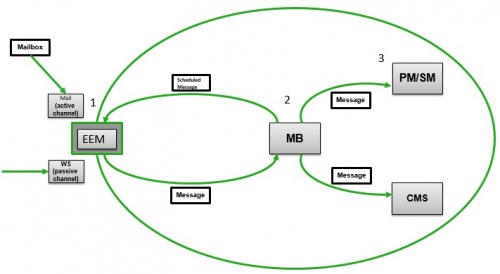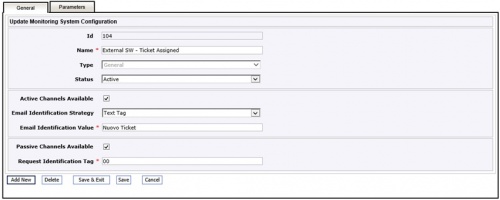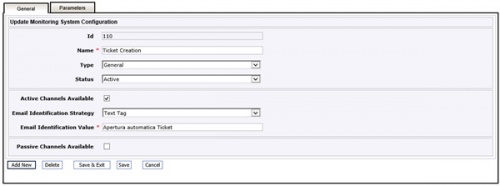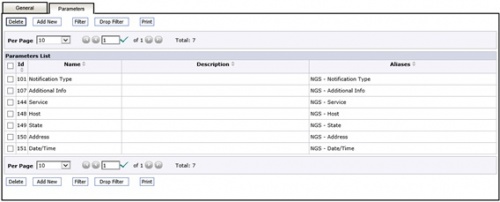Differenze tra le versioni di "EEM - External Event Management"
(Etichetta: visualeditor) |
|||
| Riga 27: | Riga 27: | ||
The following paragraphs gives an overview of ''[[Glossary|EEM]]'' configuration. | The following paragraphs gives an overview of ''[[Glossary|EEM]]'' configuration. | ||
==== Active channel configuration ==== | ==== Active channel configuration ==== | ||
| − | |||
| − | |||
| − | |||
| − | |||
| − | |||
Using ''[[Glossary|EEM]]'' menu '''''Active Notification Channels''''' it is possible to define an ''[[Glossary|active channe]]''l which is mapped on an existing mailbox. | Using ''[[Glossary|EEM]]'' menu '''''Active Notification Channels''''' it is possible to define an ''[[Glossary|active channe]]''l which is mapped on an existing mailbox. | ||
| Riga 75: | Riga 70: | ||
|} | |} | ||
| − | ==== Passive channel ==== | + | ==== Passive channel configuration ==== |
| − | + | The only configuration needed for ''[[Glossary|passive channel]]'' is in the ''[[Glossary|monitoring system configurations]]'' (see below). The <u>Active Channels Available</u> shall be set in order to have a monitoring system configuration working on the passive channel. | |
In this case, a client call is accepted if the Request Identification tag and the expected Parameters are properly passed into the SOAP message. | In this case, a client call is accepted if the Request Identification tag and the expected Parameters are properly passed into the SOAP message. | ||
| Riga 84: | Riga 79: | ||
[[File:EEM passive configuration v1.0.jpg|centre|thumb|500x500px|EEM Passive Configuraiton]] | [[File:EEM passive configuration v1.0.jpg|centre|thumb|500x500px|EEM Passive Configuraiton]] | ||
| − | ==== | + | ==== Monitoring system configurations ==== |
A MSC (Monitoring System Configuration) is composed by General and Parameter informations. | A MSC (Monitoring System Configuration) is composed by General and Parameter informations. | ||
Versione delle 08:39, 18 ago 2015
EEM - External Event Management is one of the complementary modules of itmSUITE®. The module is aimed to enable interactions between itmSUITE® and third party applications (interfaces). The supported direction of the data flow is from the external application to itmSUITE® (input). It is possible to define and implement outbound data flow and interfaces by using the action engine component of the itmSUITE®.
Indice
Introduction
The module can receive information (inbound messages) with two modes which may be activated at the same time:
Active channel
In this mode data acquisition is made by means of mails. EEM verifies at regular intervals the existence of mail messages in a configured mailbox and processes them when found.
Passive channel
In this mode, EEM makes available web services in order to acquire data.
EEM processing steps
EEM works on inbound messages received by means of the active or passive channel through a three steps process:
- EEM processes and validates the incoming message
- EEM passes processed messages to message bus which, in turn, dispatches them to the recipients (the modules configured to subscribe to the message)
- itmSUITE® recipient module performs the configured tasks for the received message by means of the action engine
The above mentioned three steps process is illustrated in the figure below.
EEM configuration
The following paragraphs gives an overview of EEM configuration.
Active channel configuration
Using EEM menu Active Notification Channels it is possible to define an active channel which is mapped on an existing mailbox.
The image below shown the parameters needed to configure an active channel.
The following parameters shall be provided:
| Field | Meaning | Comments |
|---|---|---|
| Id | ||
| Name | ||
| Status | ||
| Logging | ||
| Host | ||
| Port | ||
| Authentication Required | ||
| Username | ||
| Password | ||
Passive channel configuration
The only configuration needed for passive channel is in the monitoring system configurations (see below). The Active Channels Available shall be set in order to have a monitoring system configuration working on the passive channel.
In this case, a client call is accepted if the Request Identification tag and the expected Parameters are properly passed into the SOAP message.
The image below shown a MSC (monitoring sytem configuration) configuration session.
Monitoring system configurations
A MSC (Monitoring System Configuration) is composed by General and Parameter informations.
The image below shown the General tab used by the system to validate the incoming data
The image below shown the Parameter tab used by the system to collect information present on a message.
One message is validated if the Identification Strategy is respected and all the parameters are presents into the body of message




